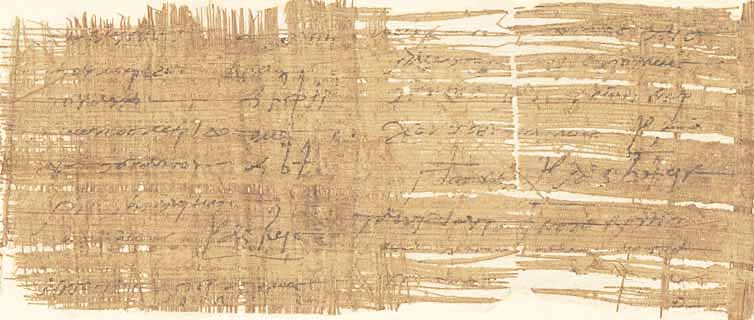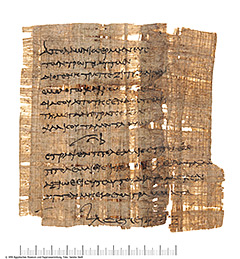UPZ II 227 (P. 1382)
At first glance, receipts appear monotonous and rather insignificant. But they provide us with an important insight into everyday life in the past and often lead to complex and socio-cultural questions. The text to be presented here also represents such a case.
This one-sided papyrus contains a receipt from Thebes in Upper Egypt, dated August 18, 134 B.C., based on the date in the last line. The papyrus originally belonged to the collection of the Greek merchant and antiquities dealer Giovanni Anastasi and was purchased in 1857 in Paris by Richard Lepsius, then vice-director of the Egyptian Museum in Berlin.
In the text an Apollonios confirms that he got two copper talents from a Diogenes who is an official of the royal bank in Thebes. That sounds rather unspectacular at first. But already the payment of the money by a bank official suggests that this could be an official matter, even if it is not explicitly mentioned. But Apollonio’s profession, which was added to his name, could give a hint. He is the interpreter of the Trogodytes.
The Latin and Greek sources give us only vague and even contradictory information about the Trogodytes. As nomads, it is difficult to locate them geographically. In the Ptolemaic period, their area can generally be located in the Arab desert on the west coast of the Red Sea, especially in the area between Egypt and Ethiopia. In the case of our text, one can probably assume that the text refers to the Trogodytes in the south of Egypt, since Apollonios received his money from the royal bank in Thebes in Upper Egypt. The Ptolemies had intensive trade connections with the Trogodytes, which were important for the country’s economic system. They made it possible to import spices and valuable goods from Arabia and India.
Apollonios now acts as interpreter for these Trogodytes. Since no other reason for the payment of money was given in this receipt, it can be concluded that his work as an interpreter for the Trogodytes is the reason for the payment of the two talents. It can also be assumed that he was employed by the state for this job, as he was paid directly by the royal bank.
But the text also contains other interesting information. In the second part a Ptolemaios explains that he wrote the receipt at the request of Apollonios, because he cannot write. Similar formulations can be found quite frequently in the texts from Greco-Roman and Byzantine Egypt. But they might not have been expected from an interpreter. It remains unclear whether Apollonios is a Greek who speaks the language of the Trogodytes, or a Trogodyte who also speaks Greek, or a person of other descent. His Greek name was too common and popular among non-Greeks to allow further conclusions to be drawn.
At least we learn something about the context of this receipt. Ptolemaios, who wrote for Apollonios, describes himself as a commander of foreign units. In this military context Apollonios can also be located, who perhaps took part as an interpreter in a trip to the land of the Trogodytes.



